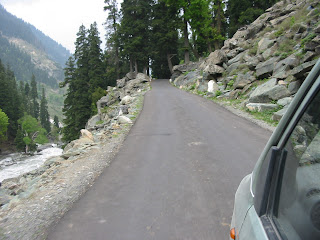The State & The Sea. And The State of the Sea
Crows are intelligent birds. All you need is a few minutes of your time and plenty of patience to observe the creature foraging for tidbits. I could do just that for a whole hour when I visited a popular beach in the Kovalam stretch on a mildly sunny Sunday morning in February. Several tourists reached the beach and set about such a routine - spread a beach towel or mat, leave belongings, use another towel to lightly 'hide' them, before heading seaward.
My subject crow waited in the wings, hopped down from a perch, stepped and jumped on the sand to reach one set of spread-out stuff, and tilted the head to delicately peck at the covering towel to try and look for the right kind of stuff - if any - left by the careful tourists. Did I say I watched patiently? The crow beat me at that - he exhibited due diligence, patience and perseverance while looking for what he wanted.



But this post is not about this crow or any other. This is about a different kind of patience that both fascinated and shamed me. A family of three stepped into the water, each parent automatically taking turns at watching out for their young child, who would alternate between adding 'brick and mortar' to her sand castle, and playing in the shallow waves.
This post is not about this child either. This post is about one of her parents.
Even as I watched the crow, the child, the tourists' (by-now familiar) routine (prepare spot on beach, wade into the water, wade out in a while, lie down to sunbathe), I could not help but notice that particular tourist - the parent - make several trips in and out of the water.
Each trip back from the water saw the parent hold a short stick, with something hanging at one end, reach the adjacent rocky ledge (the ledge serves as the access to the Kovalam tourism police post) deposit the item, walk back into the waves, and repeat this sequence.
In between trips, the parent forgot neither to help out with the child, nor to have the pleasure of wading and swimming in the waves. After all, that is the purpose for which many tourists make a beeline to tropical shores - to escape extreme winter elsewhere in our country and in the world.
Back to the parent. I counted 21 trips. Then I gave up. Convinced that this parent cared for the child, and cared equally well if not more for the kind of world in which that child was growing.
If one tourist can try to fish out rubbish from the sea trip after patient trip - all in the course of a brief morning sojourn to the beach - in the hope of trying to 'clean up' a portion of the beach to be used by the child, imagine the enormity of our individual and collective responsibility.
We - each of us - have to stop dumping waste as we please
We also have to start cleaning the mess to which we have collectively contributed.
“Many of the fishermen here have been telling that recently, more than fish, it’s plastic that gets caught in their nets,” he said, pointing out that with more efforts on from various quarters to pump the city’s waste into the sea, shoreline fishing was being made a sitting duck for the ill-effects of all kinds of pollution, and not just plastic." [Quoting from "A turtle’s tryst with waste" (local newspaper report dated 8 Feb 2014)]
“Many of the fishermen here have been telling that recently, more than fish, it’s plastic that gets caught in their nets,” he said, pointing out that with more efforts on from various quarters to pump the city’s waste into the sea, shoreline fishing was being made a sitting duck for the ill-effects of all kinds of pollution, and not just plastic." [Quoting from "A turtle’s tryst with waste" (local newspaper report dated 8 Feb 2014)]






Comments
Post a Comment
i appreciate that you have some thoughts to share, and are taking the effort to do so.